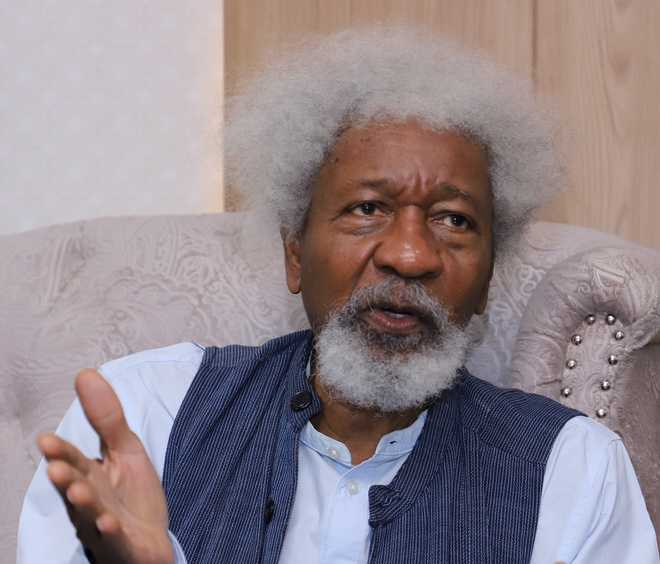
Nobel laureate Prof Wole Soyinka
Amarjot Kaur
Tribune News Service
Chandigarh, July 20
Vociferous and articulate, the first African Nobel laureate in literature Prof Wole Soyinka (85) doesn’t mince words while voicing his critical stance on Nigerian politics and the role of education system in shaping a country’s youth. At Chandigarh University’s convocation ceremony, as he nurses a nasty cold, The Tribune correspondent strikes a 15-minute conversation with Soyinka, a fundamental democrat, who calls his brand of literature ‘Keep in View’. Also, he takes keen interest in India’s controversial scandals, like the one about Ram Rahim. Excerpts from the interview:
Do you think Nigeria is at a breaking point? What do you think has amounted to that?
It is very close. We see it internally; clerics, lawyers, other politicians and ordinary people see it. There are multiple problems. First, the people of different cultures and levels of development were lumped in one. Then there are global problems, against which we have not created sustainable infrastructures, like religious fundamentalism. It further complicates the problems, like forming wrong economic policies, so that there’s a contestation for resources. For example, the mismanagement of oil that created a wide gap between haves and have-nots. The natives are restless.
You think education can help the youth deal with such problems?
The re-tuning of the mind of students/young generation is very critical. But the question is how do we educate those in whose hands the direction of the country lies and those who have been voted in, the policymakers? It is impossible. They are sure that they know it all, as they have been elected by the public that knows it all. So, education, to solve immediate crisis, is an almost impossible undertaking. We just have to be permanent critics of the government because criticism is also a form of education.
What role does literature play in reflecting what’s happening in society, culture and politics?
It depends on the kind of literature. Sometimes, I practice what I call ‘Guerrilla Theatre’. You take an event, gather your actors, rehearse, improvise and then carry them from common marketplace to legislatures, secretariats, or where some terrible corruption cabal has been cited, and then you act a play about it. Of course, you move before they set the police on you or disappear!
Then there’s another theatre that’s calmer, more reflective; and that’s what I call ‘Keep in View’, you know like on bureaucrats’ table, there’s one tray that reads ‘out’, other that says ‘in’ and the third that’s ‘Keep in View’. Literature is very much like that. You return to it from time to time. Even when the writer is gone, his/her work is left behind. ‘Keep in View’ is also the kind of literature I write.
What’s your impression of the ‘New India’?
Well, you certainly are in turmoil. I sometimes tune in to your stations, especially when there are huge international scandals, and I want to see how you are handling yours. In case of that guru, for instance, who was charged with rape. That’s a bit of Nigeria, also. We all have problems, but it’s the question of upholding the plinth of society, which for me is the plinth of participation, accountability, or to sum it up a citizen evolution. It’s the right to express views and to choose your leaders. I’ll summarise it as democracy. I am a fundamentalist of democracy.
You think democracy is the way ahead?
Of all the choices of governance, yes! We have undergone dictatorship and diarchy, a two-headed beast that goes nowhere. Ultimately, I believe that democratic principle is what defines us as dignified beings. So, fundamentalism in democracy is forgivable. In religion, it is not.
So what happens when religion fuses with the state?
It is a sad situation. Religion is personal. I believe in secularism and democracy. Religion, as part of governance, has no place; no place at all.
1,130 get degrees
- At the sixth annual convocation ceremony of Chandigarh University, Gharuan, 1,130 students, including three PhD students, 443 PG students and 687 graduate students of engineering, were awarded degrees.
- More than 26 university toppers were awarded gold medals.



























